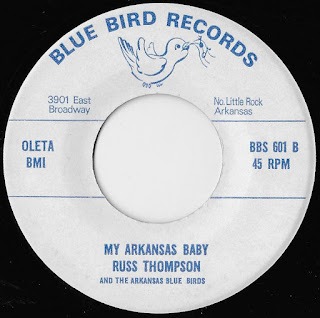
For the last decades, Lance Roberts has been an unknown and mysterious name in rock'n'roll history. As Bear Family researchers put it, "nearly all the men and women to record for Sun have been documented exhaustively, but Lance Roberts remains murky" - until now. I don't want to claim to have unearthed his whole story but I managed to bring a little light into the shadowy career of Roberts.
He was born Kenny Arlyn Roberts on November 12, 1939, in Norman Park, Colquitt County, Georgia. At least his father's family had been living in the same South Georgia area since the early 19th century. Roberts' parents' first child died as an infant in 1935 but the couple were blessed with two more children, Kenny in 1939 and his sister Jane in 1941. Other details about Roberts' early life still have to be discovered.
Roberts' way into music business and his stroke of luck to record his debut for a major label are more riddles to solve. In 1959, Roberts, who had changed his name for performing purposes to "Lance Roberts" by then (possibly to avoid confusion with popular east coast country musician Kenny Roberts), recorded a total of four songs for Decca Records, all from the pen of the songwriting husband-and-wife duo Felice and Boudleaux Bryant. Roberts' first session took place on February 1, 1959, at the Bradley Film & Recording Studio in Nashville, probably with a line-up consisting of top Nashville studio musicians but details escape us on this issue, unfortunately. The results of this session, "You've Got Everything" and "Why Can't It Be So", were released in spring that same year on Decca #9-30891. Billboard was pleased with the "good, spirited style" of the songs and the disc saw also release in Italy on the Fonit label the following year. Noteworthy success eluded it, however. |
Lance Roberts promo picture, 1950s
|
A second session was arranged for Roberts on June 11, 1959, at the same location, which produced "What Would I Do" and the song he is maybe best remembered for, "Gonna Have Myself a Ball" (Decca #9-30955). While his first disc was on the soft teen sound side of rock'n'roll with Roberts' vocal similar to Elvis Presley's, he turned to strong rock'n'roll on his second effort, especially for "Gonna Have Myself a Ball". The pair was released around August 1959 but again, sales were likely disappointing.
Since May that year, Roberts was under contract of Acuff-Rose's new management and promotion firm ARAC (Acuff-Rose Artists Corporation), headed by Dee Kilpatrick. He was in good company there, as the firm also managed several Grand Ole Opry stars like Roy Acuff, Don Gibson, Billy Grammer, as well as newcomer Roy Orbison and Boudleaux Bryant, with whom Roberts had already made acquaintance.
 |
Billboard April 27, 1959, pop review
|
 |
Billboard August 10, 1959, pop review
|
After Decca had dropped Roberts from its roster, he found his way to Memphis, where he managed to convince the studio executives of Sun Records of his talent. As Sun's owner Sam Phillips had resiled from recording work, it is likely that one of his producers saw enough potential in the young singer from Georgia to invite him to a session in the fall of 1960. In Phillips' new studio on Madison Avenue, two songs were produced on Roberts, "The Good Guy Always Wins" and "The Time Is Right", with vocal support by the Gene Lowery Singers. The latter song was co-written by now legendary Memphis figures Charlie Feathers, Quinton Claunch, and Jerry Huffman, who had performed in a band togther, and the top side was from the pen of Arkansas songwriter Bill Husky, who later operated Jakebill Records.
The songs were released on Sun #348 around October 1960. At the time of release, Roberts was still based in Norman Parks as Sun documents reveal that his contract was sent to an address there. The songs were promising productions in commercial terms, being on the edge of rock'n'roll and pop, but Sun Records' heyday had already passed and the disc sunk without much notice.
 |
Billboard October 24, 1960, pop review
|
We lose track of Roberts for the 1961-1962 period but on January 19, 1963, Billboard reported that Lance Roberts had been signed to recording and management contracts by United Southern Artists, Inc., a record company based in Hot Springs, Arkansas. Likely spotted by the firm's A&R manager Carl Friend, Roberts cut his fourth single for the label that year, although details remain sketchy. Issued on United Southern #5-131, the disc comprised "It Was Fun While It Lasted" plus an unknown B side. An original copy of this release has yet to be found.
Roberts retained his connection with Carl Friend as more than a year later, both became heads of Joey Sasso's new Music Makers Promotion office in Nashville. This is the last hint we find on Roberts' career. At some point in his life, he changed trades and became a farmer. He married Patricia Wells in 1976, with whom he had five children.
We can say with some certainty that Roberts remained a lifelong resident of Colquitt County, Georgia, where he died on March 14, 2011, at the age of 71 years.
Discography
Decca 9-30891: Lance Roberts - You've Got Everything / Why Can't It Be So (1959)
Decca 9-30955: Lance Roberts - Gonna Have Myself a Ball / What Would I Do (1959)
Fonit SP 50216: Lance Roberts - You've Got Everything / Why Can't It Be So (1960, Italy)
Sun 348: Lance Roberts with the Gene Lowery Singers - The Good Guy Always Wins / The Time is Right (1960)
United Southern Artists 5-131: Lance Roberts - It Was Fun While It Lasted / ? (1963)
See also
• The United Southern Artists label
Sources
• 45cat entry
• Rockin' Country Style entry
• Find a Grave Entry
• Bear Family Records
• Fonit single on Popsike
• Entry at Praguefrank's Country Music Discographies






























